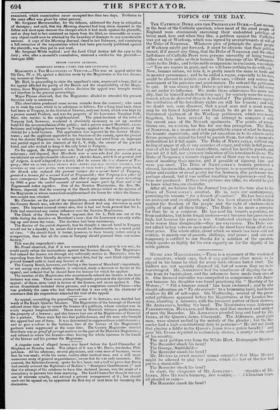TOPICS OF THE DAY.
THE CATHOLIC DUKE AND THE PROTESTANT DUKE.—Last session
in the heat of the Catholic question, when most of the good people of
England were strenuously exercising their undoubted privilege of being mad, how and when they like, a petition against the Catholics was got up at Worksop, which was signed by several tenants at will of the Duke of NORFOLK. Whatever plea of principle the good people of Worksop might put forward, it must be Obvious that their petition meant, if it meant any thing, that the Duke of NORFOLK and the other half-dozen of Catholic Peers were persons unworthy of being trusted either on their oaths or their honour. The language of his Worksop te- nants to the Duke, and to his noble companions in exclusion, was simply —" You are rogues in grain, and we will have nothing to do with you.' Now, human nature, we take it, is pretty much the same in lord i and in meaner personages ; and to be called a rogue, especially to his face, might be allowed to irritate even a HOWARD, without any serious im- peachment of his patience and good-nature. He ordered the petitioners to quit. It was wrong in the Duke to get into a passion; he did wrong to act under its influence. We make these admissions the more rea- dily, that he himself made them long ago ;* for scarcely were the' notices issued, when he directed them to be recalled ! The petitioners against the restitution of his hereditary rights are still his tenants ; and will we doubt not, soon discover, that a good man and a good master may be an honest legislator even though he do go to mass. The threatened ejectment of the Worksop petitioners, which was nearly forgotten, has been revived by an attempt to compare it with the recent case of the Newark ejectments. The points of resem- blance are, we confess, too fine for our dim perception. The Duke of NORFOLK, in a moment of not unjustifiable anger at what he deemed his tenants ingratitude, and while yet uncertain as to its eftects on his future prospects, raised his hand to punish them, but after a moments deliberation let it fall again. The Duke of NEWCASTLE, without any feeling of anger at all, or any occasion of anger, and while in full posses- sion of all he had asked or could obtain, raised his hand to punish, and has not let it fall, nor given any indication of his intention to do so. The Duke of NORFOI.K.S tenants stepped out of their way to seek an occa- sion of insulting their master, and if possible of injuring hint—and were pinioned. The Duke of NEWCASTLE'S tenants preferred a shrewd, business-like, common-sense lawyer, to a speculator on popu- lation and enditer of sweet poetry for the Annuals, (the preference was perhaps absurd, but it was neither insulting nor injurious)—and they were not pardoned. If these two pictures are alike, we should be glad to know what two are dissimilar.
After all, we believe that the Journal has given the true clue to his Grace of NEWCASTLE'S conduct. He is, says our contemporary, punishing his tenants "for a breach of contract." He has been called an aristocrat and an oligarch, and he has been charged with designs against the freedom of the people and the right of election—he is guilty of none of all these things. The Duke is no more a conspira- tor than he is a conjuror. He has sent his tenants a-packing, not from ambitious, but from frugal motives—not because his passions are high, but because his purse is low. Contested elections he considers to be worse than disagreeable--they are expensive. The Duke can- not afford to buy votes in open market—he must have them all at con- tract price. The whole affair, about which so much has been said and written, is merely one of pounds, shillings, and pence ; and our con- temporary is entitled to our thanks for a solution of the question, which speaks as highly for his own sagacity as for the dignity of his noble patron.


















 Previous page
Previous page